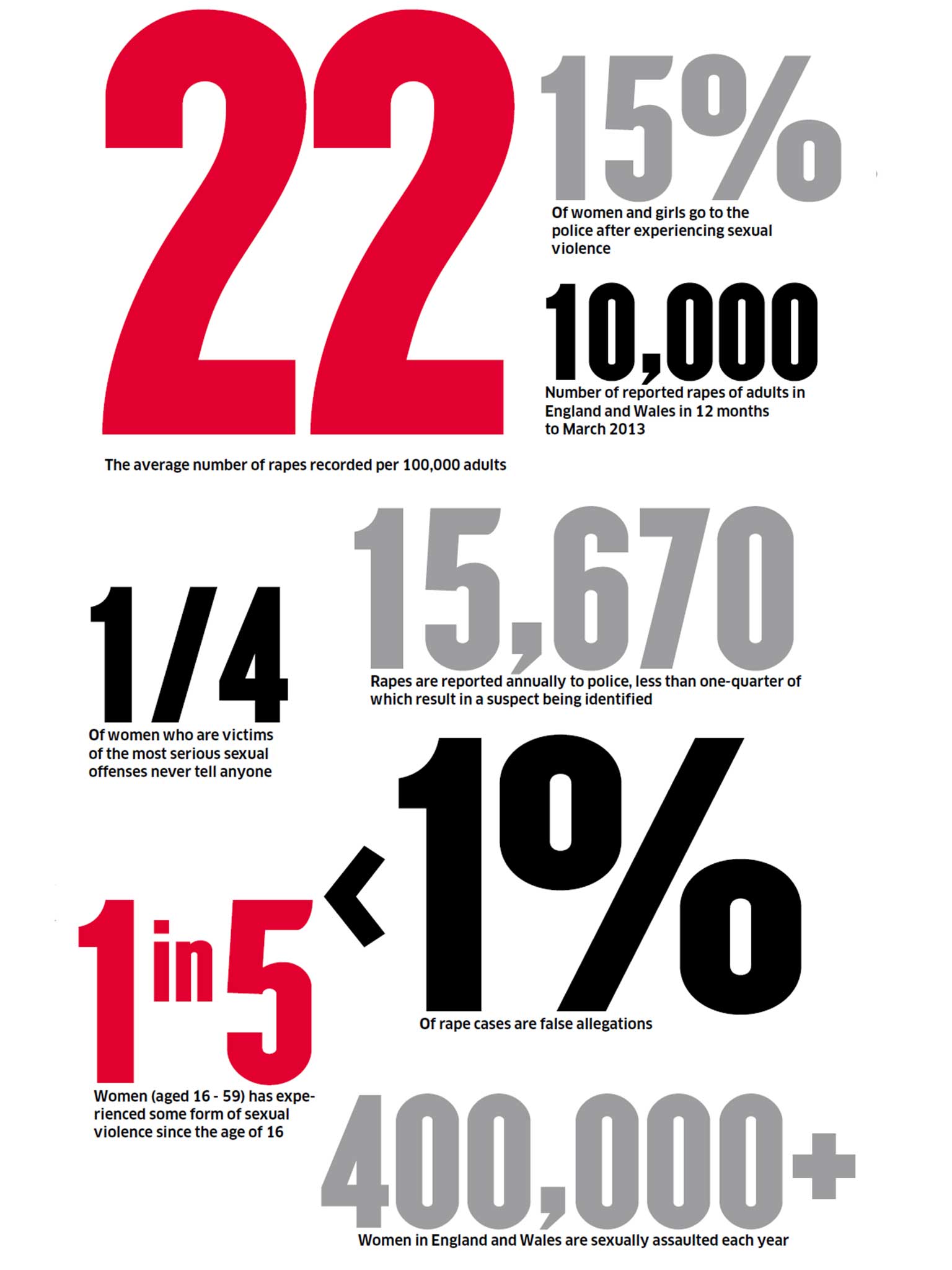Anonymity in rape cases is not the right issue for debate
As the prosecution rates are so low, we should focus on the real victims – and they aren’t men

“Cry rape” is one of those phrases that does its work insidiously. Purporting to describe only those instances in which a rape is falsely alleged, its subtle sneer in fact slides backwards towards real rapes, undermining every victim by association with that classic trope: the lying, vengeful slut. “Cry”, with its cargo of shrill hysteria. And the reference to the story of the boy shepherd who swore, again and again, that there was a wolf – only to be punished by the savaging of his flock when one finally came for real. Consciously or not, “cry rape” carries a threat, as well.
This would be bad enough if false allegations of rape were commonplace. In truth, they are vanishingly rare: fewer than 1 per cent of cases, according to an authoritative study by the Crown Prosecution Service published this year, and certainly no higher than for any other crime. This fact apparently has no purchase on the public discourse on the subject. Here’s another statistic: of the 85,000 rapes recorded by the British Crime Survey every year, just 15,000 are reported to the police. Of those, only a fifth come to court. And of those, 40 per cent do not result in a conviction. It’s funny: were it any other crime, those numbers would be universally understood as a terrible denial of justice. With rape, they are frequently understood as evidence that an awful lot of those women were making something up.
So it always is with the argument about rape. (One hesitates to call it a debate.) Impervious to the facts, we dwell insistently on the one aspect that is conceivably hurtful for men: the convention of naming suspects, which sometimes means that those who are accused but do not go on to face charges are left with a permanent stigma.
While I don’t, in the end, side with them – we mustn’t particularise rape still further, and make our faith in the women still shakier – I do see the arguments for anonymity. It’s an extremely difficult issue. But there’s still something off here. As a personal campaign it’s wholly understandable; as a wider cultural response to the horror of rape, it’s plainly an indication of misogyny. Imagine a nuclear catastrophe that leads to an in-depth discussion of the limitations of haz-mat suits.
I am often struck, when a right-wing commentator comes in for a corrective dose of online fury, by how completely the criticism misses the point. His opinion one way or another is almost moot. The real question is: why is this the bit that you think it’s worth writing about?

These issues were raised again this week, when a young man called Ben Sullivan, who had been accused of rape, learned that the case against him had been dropped. Mr Sullivan is the president of the Oxford Union debating society, and the allegations against him had provoked a discussion about the prevalence of sexual assault on university campuses, and about the appropriate response for an institution when its leader is accused of such a terrible crime.
In the aftermath of the news, Mr Sullivan said that he believed those accused of rape should be granted anonymity. Anyone in his circumstances would feel the same, and in fairness his suggestion is one of limited scope: that the accused should be shielded from public scrutiny only until the conclusion of an initial investigation. Nonetheless, the headlines were all about anonymity, and not about rape. After an earlier intervention in Mr Sullivan’s support from Nigel Evans, the former deputy speaker of the House of Commons who was tried for rape and cleared, the old argument is building up a fresh head of steam.
This is predictable. It’s a subject on a very short cycle, and it will keep returning for as long as rape does; there is not much reasoning with people who think that this is the aspect that matters the most.
Perhaps, then, those who wish that things were different should focus more intently on strategy. If so, they might look particularly hard at the one move that dragged this grim affair into the public spotlight more than any other: the campaign to have scheduled speakers boycott the Oxford Union.
You can understand the impulse, I guess. The Oxford Union, one of that university’s most revered institutions, taking no action when faced with allegations of this magnitude – it sticks in the throat. So it was that an open letter went round calling for Mr Sullivan to step down, and for guests to cancel their appearances unless he did so. It gained hundreds of signatories, among them the writers Laurie Penny, Owen Jones, and Caroline Criado-Perez. It drew huge attention to the story and put significant pressure on the Union to take action. And it was completely wrong-headed.
As luck would have it, I had been invited to take part in a debate a couple of weeks ago. So I thought about all this quite hard. And, even as the president of Human Rights Watch and the secretary general of Interpol withdrew, it all seemed to me ridiculous. One of the worst things about our general cultural resistance to taking rape seriously, and our failure to protect the women who report it, is that it invites desperate measures. The letter sent to the Union risked libel and contempt of court in its campaigning zeal. It made Mr Sullivan into a martyr. It provided ammunition to those who would see men as the victims of rape; who say that to trust the women who report it is to participate in a witch-hunt.
When the Union cancelled my invitation a couple of days before the debate – presumably someone more exciting had become available – I can’t pretend that I wasn’t a bit relieved. To say that you trust women who report sexual violence and to go to an event organised by someone accused of it is a deeply uncomfortable position to hold. But it shouldn’t be.
There’s no rallying cry here, no siren of outrage. I can’t blame those who wrote the letter for wanting to do something, anything, to shake the culture that allows rape to happen so often into some kind of response. But if it isn’t possible to bemoan the general horror at the same time as respecting a particular legal process, we are in a terrible mess. And if the proposed solution is extrajudicial, things are only going to get worse.
Bookmark popover
Removed from bookmarks